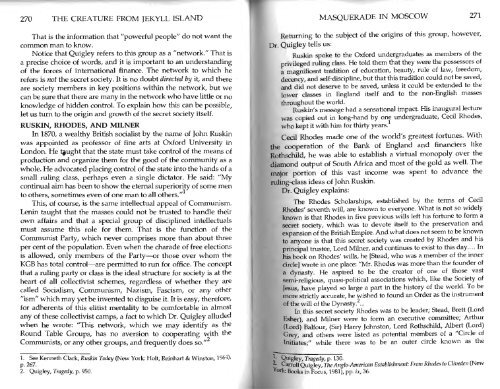Create successful ePaper yourself
Turn your PDF publications into a flip-book with our unique Google optimized e-Paper software.
270 THE CREATURE FROM JEKYLL ISLAND<br />
That is the information that "powerful people" do not want the<br />
common man to know.<br />
Notice that Quigley refers to this group as a "network." That is<br />
a precise choice of words, and it is important to an understanding<br />
of the forces of international finance. The network to which he<br />
refers is not the secret society. It is no doubt directed by it, and there<br />
are society members in key positions within the network, but we<br />
can be sure that there are many in the network who have little or no<br />
knowledge of hidden control. To explain how this can be possible,<br />
let us turn to the origin and growth of the secret society itself.<br />
RUSKIN, RHODES, AND MILNER<br />
In 1870, a wealthy British socialist by the name of John Ruskin<br />
was appointed as professor of fine arts at Oxford University in<br />
London. He tjught that the state must take control of the means of<br />
production and organize them for the good of the community as a<br />
whole. He advocated placing control of the state into the hands of a<br />
small ruling class, perhaps even a single dictator. He said: "My<br />
continual aim has been to show the eternal superiority of some men<br />
to others, sometimes even of one man to all others."<br />
This, of course, is the same intellectual appeal of Communism.<br />
Lenin taught that the masses could not be trusted to handle their<br />
own affairs and that a special group of disciplined intellectuals<br />
must assume this role for them. That is the function of the<br />
Communist Party, which never comprises more than about three<br />
per cent of the population. Even when the charade of free elections<br />
is allowed, only members of the Party—or those over whom the<br />
KGB has total control—are permitted to run for office. The concept<br />
that a ruling party or class is the ideal structure for society is at the<br />
heart of all collectivist schemes, regardless of whether they are<br />
called Socialism, Communism, Nazism, Fascism, or any other<br />
"ism" which may yet be invented to disguise it. It is easy, therefore,<br />
for adherents of this elitist mentality to be comfortable in almost<br />
any of these collectivist camps, a fact to which Dr. Quigley alluded<br />
when he wrote: "This network, which we may identify as the<br />
Round Table Groups, has no aversion to cooperating with the<br />
Communists, or any other groups, and frequently does so."<br />
MASQUERADE IN MOSCOW 271<br />
Returning to the subject of the origins of this group, however,<br />
t)r. Quigley tells us:<br />
Ruskin spoke to the Oxford undergraduates as members of the<br />
privileged ruling class. He told them that they were the possessors of<br />
a magnificent tradition of education, beauty, rule of law, freedom,<br />
decency, and self-discipline, but that this tradition could not be saved,<br />
and did not deserve to be saved, unless it could be extended to the<br />
lower classes in England itself and to the non-English masses<br />
throughout the world.<br />
Ruskin's message had a sensational impact. His inaugural lecture<br />
was copied out in long-hand by one undergraduate, Cecil Rhodes,<br />
who kept it with him for thirty years.<br />
Cecil Rhodes made one of the world's greatest fortunes. With<br />
the cooperation of the Bank of England and financiers like<br />
Rothschild, he was able to establish a virtual monopoly over the<br />
diamond output of South Africa and most of the gold as well. The<br />
major portion of this vast income was spent to advance the<br />
ruling-class ideas of John Ruskin.<br />
Dr. Quigley explains:<br />
The Rhodes Scholarships, established by the terms of Cecil<br />
Rhodes' seventh will, are known to everyone. What is not so widely<br />
known is that Rhodes in five previous wills left his fortune to form a<br />
secret society, which was to devote itself to the preservation and<br />
expansion of the British Empire. And what does not seem to be known<br />
to anyone is that this secret society was created by Rhodes and his<br />
principal trustee, Lord Milner, and continues to exist to this day.. .. In<br />
his book on Rhodes' wills, he [Stead, who was a member of the inner<br />
circle] wrote in one place: "Mr. Rhodes was more than the founder of<br />
a dynasty. He aspired to be the creator of one of those vast<br />
semi-religious, quasi-political associations which, like the Society of<br />
Jesus, have played so large a part in the history of the world. To be<br />
more strictly accurate, he wished to found an Order as the instrument<br />
of the will of the Dynasty. 2 ...<br />
In this secret society Rhodes was to be leader; Stead, Brett (Lord<br />
Esher), and Milner were to form an executive committee; Arthur<br />
(Lord) Balfour, (Sir) Harry Johnston, Lord Rothschild, Albert (Lord)<br />
Grey, and others were listed<br />
as potential members of a "Circle of<br />
Initiates;" while there was to be an outer circle known as the<br />
1. See Kenneth Clark, Ruskin Today (New York: Holt, Reinhart & Winston, 1964),<br />
p. 267.<br />
2. Quigley, Tragedy, p. 950.<br />
|- Quigley, Tragedy, p. 130.<br />
2 -<br />
Carroll Quigley, The Anglo-American Establishment: From Rhodes to Cliveden (N<br />
Y °rk: Books in Focus, 1981), pp. ix, 36.<br />
ew


